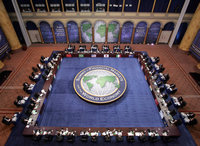When finance ministers of the Group of Twenty nations come together on Friday to prepare for the upcoming G-20 summit, observers, journalists and analysts will no doubt focus on disagreements among the members over how to tackle the ongoing world economic crisis. After all, differing views on the best course of action have already stolen the headlines. To be sure, points of contention do exist and they could make for a tense meeting at West Sussex this weekend, as finance ministers struggle to come up with a productive and forceful agenda at the April summit in London. And yet, the attention to differing views misses one of the most striking worldwide developments of the financial crisis: While everyone will talk about disagreement, ironically, what has characterized government response to the global meltdown is the degree of unanimity about what should be done. Six months after a real estate-induced slowdown in the United States resulted in the collapse of the financial giant Lehman Brothers, triggering an international financial tsunami, governments the world over agree about their role. In the face of a looming economic catastrophe, the consensus now dictates that government has a duty to step in with expensive stimulus packages in order to inject a Keynesian boost to the free market. Alternative views are so far in the minority that the big debates, the emotional disagreements, are not over which policy to follow but rather over what is the most appropriate size for the stimulus packages.
World Citizen: A Most Surprising Consensus on the Economic Crisis

